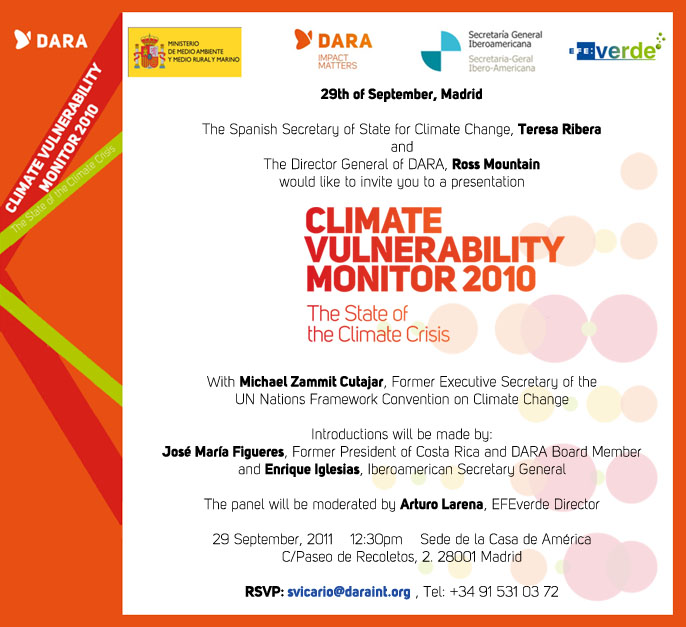
Series
Climate Impact Series
(17)
Climate Media
(16)
Climate Debate
(6)
Climate Adaptation
(4)
FORCE blogs
(3)
Staff and Partners
(3)
Climate Reports
(2)
tcktcktck
(2)
CVM in the News
(1)
Thursday, 29 September 2011
Wednesday, 14 September 2011
Did we learn from Katrina?
Hurricane Irene and now Tropical Storm Lee remind us that the lessons of Hurricane Katrina have not been learned. They also remind us that among developed countries America is the frontline of climate change. The world needs America to recognize this crisis and to lead the charge in tackling it before significantly greater harm is done.
We know developing countries are worst hit by climate change. But the past year has seen a frightening string of weather-related disasters in industrialized countries. Witness extraordinary fires in Russia last summer; mass flooding in Queensland, Australia early in the year; more flooding along the Mississippi and the Missouri rivers in the spring; a North American heat wave this summer; ongoing severe drought in the southern United States; Typhoon Talas in Japan; and the list goes on.
We clearly failed to learn that the developed world is also at risk. Industrialized countries already incur over half of the economic costs of climate change. Without action, the climate change death toll will also rise. The world keeps heating up, and with it, weather can only become more extreme. A Declaration of the Climate Vulnerable Forum, a group of governments of highly affected countries founded by the charismatic Maldives President, aptly warned that: “the fate of the most vulnerable will be the fate of the world”.
Crucially, we have not learned to respect the precautionary principle. Instead, every minor scientific uncertainty has been exploited to shun action. Over-publicized concerns around the validity of the science mask the 97% of actively publishing specialists who concur with the basic physics of climate change. The 3% who differ with the prevailing view are taken far more seriously than similar sized groups who, for instance, disagree that smoking is an important risk factor for lung cancer or that HIV might cause AIDS.
The basic physics are quite simple. As the world heats up, water evaporates faster from land and sea. Unfortunately, that usually leaves some places particularly dry and hot, and other places inundated with rain and flooding. The extra precipitation comes with storms – tropical cyclones also grow in intensity. Flooding is further worsened by local snow and glacial melt driven by the hotter weather.
We shouldn’t be looking around to pin climate change wholesale on any single disaster. That would be missing the point. Climate change is causing a general growth in the intensity of hydro-meteorological phenomena. We must recognize that and react to it. Even small increases in severity can have exponential increases in impact, for instance by overwhelming previously sound defences, like river or coastal levees.
It doesn’t help that the bulk of the impacts occur far from the public eye. The main cause of vulnerability to climate change is not weather but poverty. Changes in climate are happening everywhere, but their effects are more or less devastating where people are more or less equipped to withstand them. Where poverty is endemic, impacts are acute. Drought in America is almost without casualty, even as fires consume several million acres of land in Texas. Drought in the Horn of Africa leaves tens of thousands of children dead.
I was involved in a global assessment of climate vulnerability using comparative indicators for 184 countries, published as the Climate Vulnerability Monitor (http://daraint.org/climate-vulnerability-monitor/climate-vulnerability-monitor-2010/) last December by DARA and the Climate Vulnerable Forum. America along with Spain were the only major advanced economies to register a vulnerability of “High”, in a category dominated by developing countries such as China, Gabon or El Salvador.
For geographical reasons, the United States is particularly vulnerable to a range of climate stresses. Not entirely surprising though, income inequality has rocketed in America over recent decades. Disparities in the income of Americans are now as extreme as for the people of China and Gabon, although not – yet – as severe as El Salvador. This contributes to a heightened vulnerability to climate change only made worse by the economic downturn.
Adding insult to injury, America risks being left behind as other economies reap the benefits of early investment in cleaner technologies for economic productivity, energy security, environmental protection and human health. Such compelling arguments have led China for example to invest double what the United States does each year in greening the economy.
America has clung to polluting technologies, think Gulf Oil Spill. It remains widely sceptical of climate science, and with it the need to react accordingly in the interest of its own public’s safety. And it ditched the Kyoto Protocol, in a deathblow to any global resolution to this quintessentially global problem. America has fallen into a trap of its own making that the whole world suffers. This is a major injustice to the people of America, without even touching on its burning obligations to a wider global community.
The chance to plot a different course is still within reach. With the consequences of bad policy laid bare for all to see, it’s time to wake up. Americans should demand action on climate change without delay. And it’s in the interest of all others to support Americans in seeking the firmest possible domestic and international response to this crisis.
Subscribe to:
Comments (Atom)

